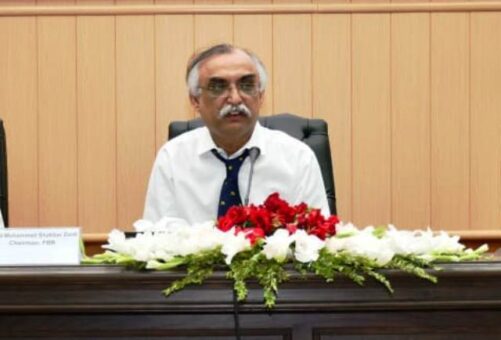KARACHI: Federal Board of Revenue (FBR) has issued list of items that are prohibited for clearance of import or export under Customs Act, 1969.
The FBR issued Customs Act, 1969 updated till June 30, 2019 (incorporating changes brought through Finance Act, 2019) and explained Section 15 related to prohibition.
Section 15
Prohibitions:- No goods specified in the following clauses shall be brought into or taken out of Pakistan, namely:-
(a) counterfeit coins, forged or counterfeit currency notes, and any other counterfeit product;
(b) any obscene book, pamphlet, paper, drawing, painting, representation, figure, photograph, film, or, article, video or audio recording, CDs or recording on any other media;
(c) goods having applied thereto a counterfeit trade mark within the meaning of the Pakistan Penal Code, 1860 (Act XLV of 1860), or a false trade description within the meaning of the Copyright Ordinance, 1962 (XXXIV of 1962), the Registered Layout-Designs of Integrated Circuits Ordinance, 2000 (XLIX of 2000), the Registered Designs Ordinance, 2000 (XLV of 2000), the Patents Ordinance, 2000 (LXI of 2000), and the Trade Marks Ordinance, 2001 (XIX of 2001);
(d) goods made or produced outside Pakistan and having applied thereto any name or trade mark, being or purporting to be the name or trade mark of any manufacturer, dealer or trader in Pakistan, unless,-
(i) the name or trade mark is, as to every application thereof, accompanied by a definite indication of the goods having been made or produced in a place outside Pakistan; and
(ii) the country in which that place is situated is in that indication shown in letters as large and conspicuous as any letter in the name or trade mark, and in the same language and character as the name or trade mark;
(e) goods involving infringement of copyright, layout-design of integrated circuits, industrial designs, patents within the meaning of the Copyright Ordinance, 1962 (XXXIV of 1962), the Registered Designs Ordinance, 2000 (XLV of 2000), and the Patents Ordinance, 2000 (LXI of 2000), respectively; and
(f) goods made or produced outside Pakistan and intended for sale, and having applied thereto, a design in which copyright exists under the Copyright Ordinance, 1962 (XXXIV of 1962), the Registered Layout –Designs of Integrated Circuits Ordinance, 2000 (XLV of 2000), the Patents Ordinance, 2000 (LXI of 2000), and the Trade Marks Ordinance, 2001 (XIX of 2001), in respect of the class to which the goods belong or any fraudulent or obvious imitation of such design, patent, copyright except when the application of such design has been made with the license or written consent of the registered proprietor, right holder of the design, patent or copyright, as the case may be:
Provided that offences relating to goods imported or exported in violation of Intellectual Property Rights shall, notwithstanding any thing contained in any other law for the time being in force, be adjudicated under section 179 by the appropriate officer of customs.
Section 16
Power to prohibit or restrict importation and exportation of goods.- The Federal Government may, from time to time, by notification in the official Gazette, prohibit or restrict the bringing into or taking out of Pakistan of any goods of specified description by air, sea or land.
Section 17
Detention, seizure and confiscation of goods imported in violation of section 15 or section 16.- Where any goods are imported into, or attempted to be exported out of, Pakistan in violation of the provisions of section 15 or of a notification under section 16, such goods shall, without prejudice to any other penalty to which the offender may be liable under this Act or the rules made there under or any other law, be liable to detention, for seizure or confiscation subject to approval of an officer not below the rank of an Assistant Collector of Customs, and seizure for confiscation through adjudication, if required.
It may be mention here that the ministry of commerce through SROs 927 and 928 dated August 9, 2019 imposed complete ban on trade with India.



